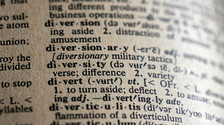Molly
I think "escape from the daily routine" is correct but I also see people write "escape the daily routine". Thank you!
1 окт. 2023 г., 15:28
Ответы · 8
2
Both are correct. However, there are some cases where they are not interchangeable.
You can say:
"It is important to escape the daily routine now and then"
or
"It is important to escape from the daily routine now and then"
You can say:
"Taking up a new hobby is a good escape from the daily routine"
You CAN'T say:
"Taking up a new hobby is a good escape the daily routine"
1 октября 2023 г.
2
Either one is fine. "Escape" can be transitive or intransitive. I prefer it without "from" in this case. Using fewer unnecessary words is usually better.
1 октября 2023 г.
Good question. One of the meanings of ‘to escape something’ is ‘to avoid’.
He escaped from prison twice. (He was in prison and got free of it by physically leaving)
He escaped prison by pleading guilty to the charge. (He was never in prison. He avoided going there by admitting his crime. ‘From’ would be wrong here)
She escaped the awkwardness of seeing her ex by declining the invitation. (She avoided it. She never felt awkward. Not ‘from)
She escaped from the awkwardness by leaving the party where she kept running into her ex. (She felt awkward and got free of it. ‘From’ is optional)
He escapes the extreme cold by spending the winter months in Arizona. (Avoids, No ‘from’)
Let’s escape from the cold and go to Arizona next week. (I’m in the cold now. ‘From’ is optional)
2 октября 2023 г.
Both are correct
2 октября 2023 г.
You can escape from one place to another. Examples
"He escaped from France"
"He escaped to England"
"He escaped from France to England"
Without a preposition, it is the same as "from":
"He escaped France", but "from" adds clarity.
"Escape" is also a noun:
"He made a lucky escape from the burning building."
"He made a lucky escape to safety."
"He made a lucky escape."
1 октября 2023 г.
Все еще не нашли ответы?
Напишите свои вопросы, и пусть вам помогут носители языка!
Molly
Языковые навыки
китайский (путунхуа), английский, французский, японский, корейский, вьетнамский
Изучаемый язык
китайский (путунхуа), английский, французский, японский, корейский
Статьи, которые тебе могут быть интересны

Top 6 Mistakes to Avoid with Vocabulary Acquisition
23 нравится · 4 Комментариев

Navigating Your First Job: Do's and Don'ts in the Workplace
44 нравится · 18 Комментариев

What Content to Watch to Acquire Advanced-level Proficiency
75 нравится · 48 Комментариев
Еще статьи
